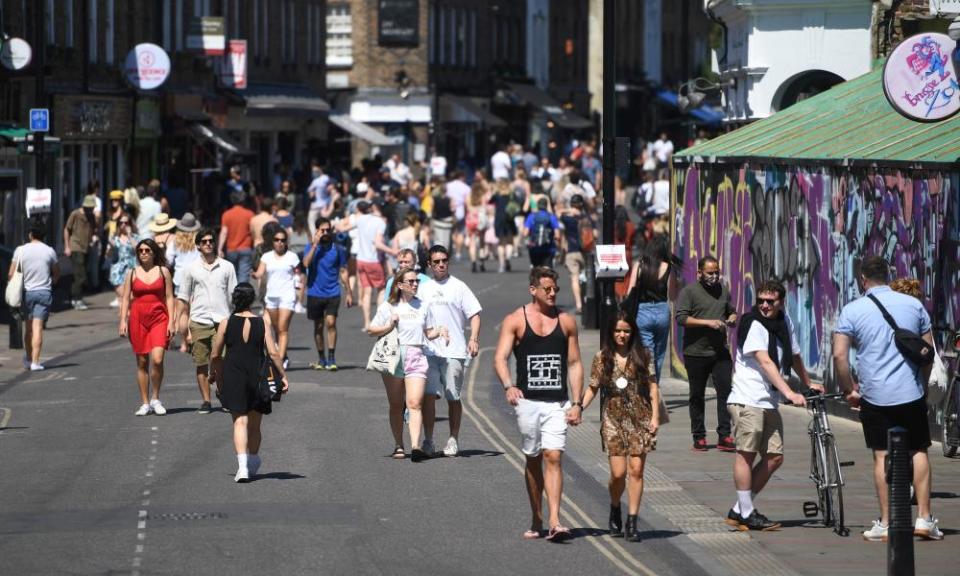England 'risks Covid-19 surge' without test-and-trace safety net

The government is facing increasing pressure from its scientific advisors over the decision to ease England’s lockdown, with one warning that the Dominic Cummings affair has eroded trust in its authority.
Prof Robert West, a member of the Scientific Pandemic Influenza Group on Behaviours (SPI-B) that advises the Scientific Advisory Group for Emergencies (Sage), emphasised on Saturday that about 8,000 infections, and 400 deaths, are still happening each day.
West said the decision by Cummings, the prime minister’s key adviser, to travel from London to Durham during the full lockdown would have an impact on people adhering to the latest rules.
The University College London scientist said: “Trust in authority telling you to do things is very important when it comes to people adhering to those rules. When people see something like the Cummings affair … that’s not a recipe for trust.”
West predicted there would be an increase in infection rates and a second wave of the virus once the lockdown was eased, accusing the government of playing politics during a health crisis.
“Put all this together and you have a huge risk, and it’s not just me saying that, that there will be an increase in infection rates. The government is not taking its responsibilities for political leadership seriously.
“This should not be treated as a political crisis but as a health crisis: if you treat it as a political crisis it’s all about managing your reputation; if you treat it as a health crisis it’s about saving lives.”
Separately, Prof Peter Horby said on Saturday that, while thousands of people a day are still becoming infected with coronavirus, lockdown measures may be being eased too soon.
Horby, of the University of Oxford, joined Sir Jeremy Farrar and Prof John Edmunds, all members of Sage, in warning that ministers were taking risks.
Boris Johnson has announced a gradual easing of the lockdown in England from Monday, when friends and relatives will be able to meet in parks and gardens in socially distanced groups of six.
“Happy Monday” will also signal the reopening of schools – allowing children in nurseries, early-years settings, reception, year 1 and year 6 to return to class – as well as more shops, with outdoor retail and car showrooms able to resume operations.
Horby told BBC Radio 4’s Today programme: “You know, we have still got 8,000 cases a day. We have been very successful in bringing it down, decreasing the numbers because of the social distancing.”
But he said it was vital “we don’t lose control again”.
He highlighted the scientific advisers’ advice regarding the NHS test and trace system, which is being rolled out across England with the help of 25,000 contact tracers.
“We are entering a period where there is a risk of increasing transmission, but we don’t yet have that safety net fully in place. Returning to a situation where we lost control again is far worse than another week or two of social measures,” he said.
The test-and-trace programme will not be operational at a local level until the end of June, and an accompanying app has been delayed by several weeks.
Farrar also said the test-and-trace system needed to be “fully working” before measures were eased.
He wrote on Twitter: “C-19 spreading too fast to lift lockdown in England. Agree with John & clear science advice.
“TTI (test, trace and isolate) has to be in place, fully working, capable dealing any surge immediately, locally responsive, rapid results & infection rates have to be lower. And trusted.”
A poll conducted by the National Association of Head Teachers (NAHT) of 2,000 of its members revealed that nine out of 10 plan to open their schools on 1 June, but with fewer children than the government has advised, despite opposition from teaching unions.
Johnson has said the government’s five key tests required for easing lockdown have been met and schools can admit more pupils from Monday.
The UK government has said that these five tests have to be met before they will consider easing coronavirus lockdown restrictions:
The NHS has sufficient capacity to provide critical care and specialist treatment right across the UK
A sustained and consistent fall in daily deaths from Coronavirus
Reliable data to show that the rate of infection is decreasing to manageable levels across the board
Operational challenges including testing and personal protective equipement (PPE) are in hand with supply able to meet future demand
Confident that any adjustments to the current measures will not risk a second peak of infections that overwhelms the NHS
The 450,000-member strong National Education Union (NEU) has said the date is “not viable”.
Other unions, including the NAHT and the NASUWT, raised their concerns about reopening schools on 1 June with the education secretary, Gavin Williamson, on Thursday.
Minutes of Sage meetings released by the government on Friday revealed a sense of rising anxiety as scientists saw the number of cases grow faster than expected at the start of the outbreak, with the experts recommending on 13 March that household isolation and the protection of older and more vulnerable people should happen “soon”.
Three days later, the advice changed: the committee heard there could be 10,000 new cases a day, prompting them to recommend further physical distancing “as soon as possible” adding that a “significant increase in testing” was needed.
Sage also considered documents on the track-and-trace system, with one report from behavioural scientists saying they anticipated “major behavioural barriers” to people using the NHS contact-tracing app, which would prevent it from being the primary method of containing outbreaks.

